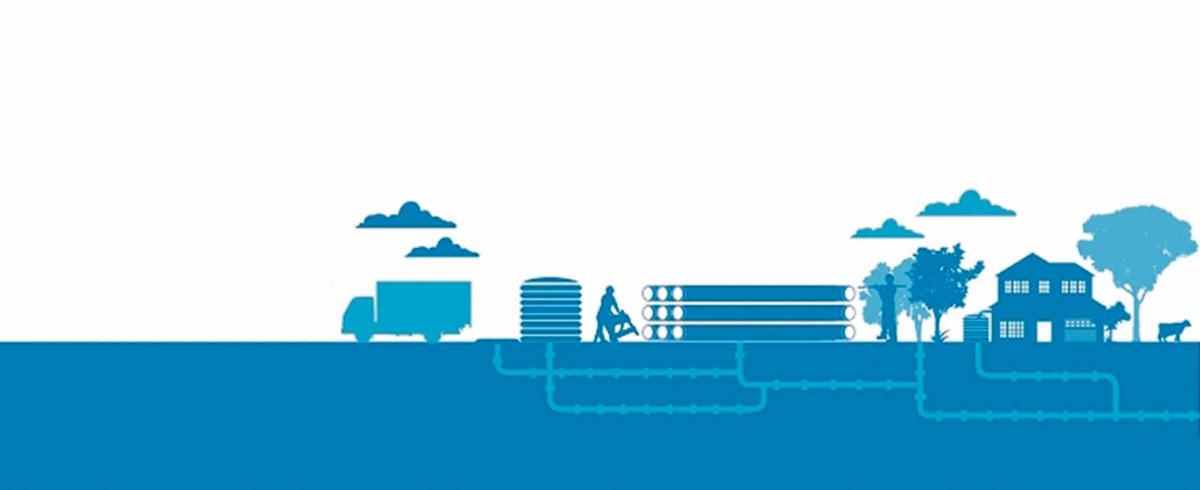 Civic bodies and water providers in India are under constant pressure to provide clean, uncontaminated water. However, they often struggle to cope with spiralling demands due to outdated infrastructure and poor pumping systems. Until recently, a particular train was used to transport around five lakh litres of water to parched place called Latur, situated in Maharashtra’s Marathwada region. The water carried by the train was stored in a well near the Latur railway station. Similarly, for the past 14 years, various parts of Rajasthan have been provided with water with assistance from Indian railways. The state’s Public Health Engineering Department (PHED) has been running a 50-wagon train from Ajmer to Bhilwara daily, carrying 25 lakh litres of water.
Civic bodies and water providers in India are under constant pressure to provide clean, uncontaminated water. However, they often struggle to cope with spiralling demands due to outdated infrastructure and poor pumping systems. Until recently, a particular train was used to transport around five lakh litres of water to parched place called Latur, situated in Maharashtra’s Marathwada region. The water carried by the train was stored in a well near the Latur railway station. Similarly, for the past 14 years, various parts of Rajasthan have been provided with water with assistance from Indian railways. The state’s Public Health Engineering Department (PHED) has been running a 50-wagon train from Ajmer to Bhilwara daily, carrying 25 lakh litres of water.
The present Indian government has emphasised creation of smart cities. In the Indian context, a smart water management system should be an important part of the smart city vision. Even after the Modi government selected the first 20 cities for its smart city programme, the private sector is yet to warm up to investing in big-ticket urban infrastructure projects. Nevertheless, the concept of smart cities has been widely accepted.
Water challenge in India
There is an urgent need to tackle water challenges efficiently in India. Corporations, investors, and policymakers should include responsibilities to treat waste water and safeguard major water issues. According to 2030 Water Resource Group, the country faces a looming water crisis where the demand is set to outstrip supply by 50% by 2030.
India faces a more serious crisis pertaining to groundwater management. There has been a serious depletion of ground water levels in India. The country also needs a complete relook at its flood management strategies.
Growing population and increasing industrialisation coupled with declining water quality have resulted in an unhealthy competition for this scare resource worldwide and the same holds true for India. Ganagaprasad G., Vice President, Sales- Building Services, Grundfos India, a company that deals with pump offering solutions, told BE, “Given the growing demands on efficiency in commercial buildings, every system, including pumping needs to have a high performance level. By moving to intelligent pumping systems, commercial buildings can not only save costs and energy consumption, but also increase their ease of operation and maintenance.”
According to a report by CDP and KPMG, which was supported by Grundfos, in 2013, more businesses recognised water-related risks than ever before. Two-thirds of the global 500 respondents to CDP’s water questionnaire reported exposure to water-related risks, of which 64% have the potential to impact businesses then or within the next five years.
Inadequate steps
The smart cities list has already been announced but it’s time for Indian cities to have a relook into their water management systems. As per the Urban Development Ministry data, only 11 projects worth `935.93 crore of the 167 projects amounting to `12,000 crore under Public-Private Partnership (PPP) model have taken off so far. Another 21 PPP projects worth `2622.23 crore are at various stages of tendering process.
Nagpur in Maharashtra, which ranks 31st in the list of smart cities, leads in terms of smart water management systems. Nagpur, which has a population of over 2.5 million, is the first city of its size in the country to outsource water supply to a private operator under the PPP model for 25 years.
The Report “Smart Water Management Market by Advanced Water, Solution, Service - Global Forecast to 2021” states that the smart water management market is expected to grow from 48.46 billion in 2016 to 420.10 billion by 2021, at a Compound Annual Growth Rate (CAGR) of 18.9% during the forecast period. The major drivers of this market include the need to restrict non-revenue losses across the globe, the importance of sustainable use of energy and regulatory compliance of the smart water industry. Furthermore, the smart city projects and other infrastructural developments across the globe should provide huge opportunities for smart water management vendors, service providers, software providers, and consulting companies.
Prospects
A Memorandum of Understanding (MoU) has been signed between the Ministry of Railways, Government of India (MoR) and Ministry of Urban Development, Government of India (MoUD) to redevelop railway stations across the country and implement smart city programmes. MoUD is implementing significant programmes like the Smart City Mission, AMRUT and HRIDAY in various cities across the country through state government and urban local bodies.
The Central Government is also putting pressure on industries to adopt international practices to use water efficiently. The Government of India and the World Bank have signed a $500 million credit agreement for the Rural Water Supply and Sanitation (RWSS) project in the Indian states of Assam, Bihar, Jharkhand and Uttar Pradesh. An MoU signed by the India and the US is in place that aims to develop three smart cities in Allahabad, Ajmer, and Visakhapatnam. The US agreed to assist the cities in project planning, infrastructure development, feasibility studies, and capacity building.
Intelligent water management solutions are necessary to not only develop more efficient buildings but also lower operating costs for steady affordable power. Smart pumping systems will make the city smart and develop it holistically.
Add new comment